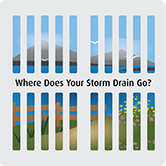
Did you know that rain falling on your property can cause pollution? Many people believe the rainwater flowing off our properties, including roofs, driveways and roads, is treated before it reaches the ocean. Often, this is not true.
When rainwater travels over impermeable (waterproof) surfaces like our driveways, roads, roofs and parking lots, it picks up chemicals, metals, dirt and oils before entering waterways and shorelines via our stormwater system. As our communities develop, the number of impervious surfaces increases, resulting in more surface runoff, which is called "stormwater."
Though it may not be filtered, the good news is stormwater does have one important layer of protection – you! As homeowners and residents, we can steward our stormwater and prevent harmful pollutants and toxins from reaching waterways in the first place. Below are some simple steps you can take to protect your waterways and shorelines.
Read More: Preventing Pollution at Home Infosheet (PDF)